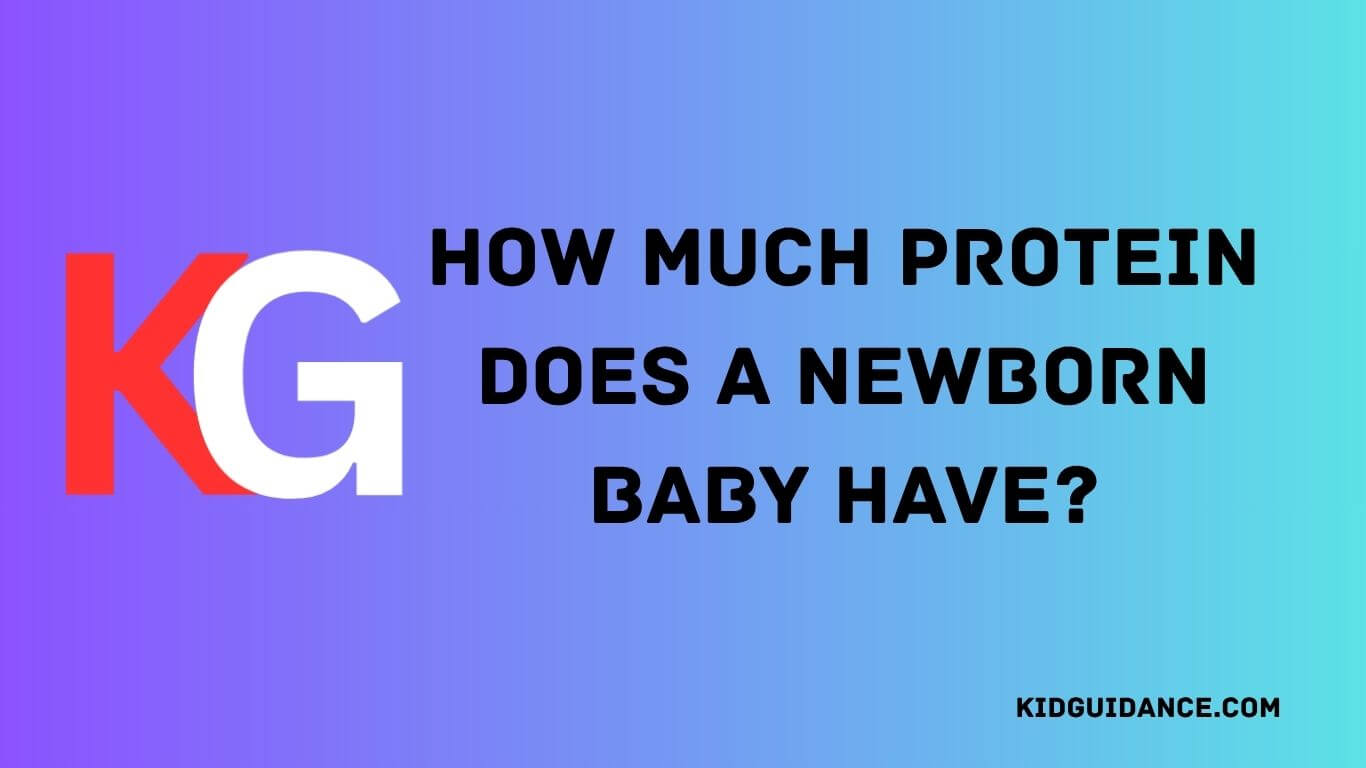Ever caught yourself wondering how much protein does a newborn baby have and why it even matters? I had the same thought when I held my baby for the first time, amazed at how fast he was growing. Turns out, newborns have about 400–500 grams of protein in their tiny bodies—critical for building muscles, organs, and a healthy brain. Backed by expert data and real parenting stories, this guide breaks it all down in plain words. Let’s explore this together and make feeding decisions that truly support your baby’s growth.
Why Protein Matters for Newborns
Protein isn’t just a nutrient—it’s a building block. It helps your baby’s body make cells, muscles, hormones, and even brain connections. It supports organ function and helps repair tissues.
In those early months, your baby is doubling in size—often in just 4 to 6 months. That kind of growth takes fuel, and protein is a big part of it.
When my daughter started holding her head up and smiling more, I realized how fast she was changing. That shift came right as her feeding patterns began to change. And yes—protein played a major role.
How Much Protein Does a Newborn Baby Have?
So let’s answer the main question: how much protein does a newborn baby have?
On average, a newborn has about 400 to 500 grams of protein in their body. That’s roughly 10% of their total body weight. So if your baby weighs 3.5 kilograms (7.7 pounds), they’ll carry around 450 grams of protein in their body tissues.
Most of this protein is in their muscles, organs, skin, and blood.
What about preemies?
Preterm babies have lower protein stores. They miss out on some of the protein transfer that usually happens in the last weeks of pregnancy. That’s why their diets are often specially fortified with protein-rich feeds.
How much protein is in one child?
As children grow, their total body protein increases. A one-year-old may have more than 1,000 grams of protein in their body. But it’s not just about how much—they also need the right kind of protein, from digestible sources like breast milk.
Daily Protein Needs for Newborns
Your baby isn’t just holding on to protein—they’re using it every day.
Breastfed babies:
Newborns (0–6 months) need around 9–11 grams of protein daily. Breast milk offers about 1 gram of protein per 100 mL, which is easy for the body to absorb. It’s what makes breast milk nature’s perfect food.
Formula-fed babies:
Formula has more protein—usually 1.5 to 2.0 grams per 100 mL. That’s because formula protein is harder to absorb. It’s adjusted to match what babies need.
The difference shows why knowing how much protein does a baby have vs. need is so important. Stored protein helps with structure, but daily intake supports growth and brain development.
Solids at 6 months:
As your baby grows and starts solids, protein needs increase. Foods like lentils, eggs, and meat add to their intake—but breast milk or formula still plays a major role.
How Much Protein Is in a Human Child?
As your baby grows into a toddler, their protein stores grow too.
| Age | Approx. Body Protein |
| Newborn | 450 grams |
| 1 Year | 1,100 grams |
| 2 Years | 1,600 grams |
Protein growth varies by child. Boys often have more muscle mass, so their protein content may be higher. Genetics and diet also play a role.
When someone asks, how much protein is in a human child, this chart offers a helpful answer.
How Many Calories Are in a Newborn Baby?
You might be surprised to learn that a newborn baby stores about 1,500 calories—mostly in fat and protein. This reserve helps in the early days when feeding is still being established.
Breakdown:
- Fat stores: ~500–600 kcal
- Protein & glycogen: ~1,000 kcal
That may not sound like much, but remember—babies use a ton of energy just staying warm, moving, and growing. Especially in the first few weeks, even sleep burns calories.
Best Protein Sources for Babies
Let’s talk about what babies actually eat—and where the protein comes from.
1. Breast Milk
This is the gold standard. It changes as your baby grows. The early milk (colostrum) is low in protein but packed with antibodies. Mature milk balances whey and casein for gentle digestion.
2. Formula
Look for a formula with a good protein-fat balance. Hydrolyzed or soy-based options are available for babies with sensitivities.
3. First Solids
Once solids begin, protein-rich foods include:
- Mashed lentils or beans
- Scrambled eggs
- Pureed meats
- Nut butters (thinly spread or mixed in)
I still remember the first time I gave my daughter mashed lentils. She made a funny face, then clapped her hands. It was messy—but magical.
Around the world, different cultures start solids differently. In Bangladesh, khichuri is common. In Italy, puréed white beans are a go-to. The point is, there’s no one-size-fits-all—just safe, nutritious choices.
Protein Needs in Special Cases
Some babies need more protein than others. Let’s look at a few examples.
Preemies
They may need up to 4.5 grams per kilogram per day. Doctors often use fortified breast milk or TPN (total parenteral nutrition) to meet these needs.
Special conditions
Babies with neonatal abstinence syndrome (NAS), respiratory distress (RDS), or congenital heart defects burn more energy. They often need protein boosts to keep up with growth and healing.
In these cases, doctors adjust the feeding plan carefully—balancing calories and protein to avoid stressing the kidneys.
Common Parent Questions About Protein
Can too much protein harm a baby?
Most healthy babies won’t get too much protein from milk or formula. But overfeeding or using supplements without medical advice can be risky. Always check with your pediatrician.
Should I give my baby protein powder or supplements?
No—not unless your doctor specifically tells you to. Breast milk or formula usually provides all the protein your baby needs.
What helped me feel confident?
I used a baby tracking app to monitor feeds. And I kept a list of questions for the pediatrician. That routine gave me peace of mind when I felt unsure.
Final Thoughts:
You don’t need to measure every gram or worry over every feed. Your baby knows how much they need—and your pediatrician will guide you if anything’s off.
What matters most is steady weight gain, active play, and alertness. If those are happening, protein intake is likely on track.
If you ever have doubts, just ask. It’s always okay to check in.
FAQs
How much protein does a newborn baby have?
A newborn baby has about 400–500 grams of protein in their body, which is around 10% of their total body weight.
How much protein does a baby need each day?
Newborns need about 9–11 grams of protein daily, which they get from breast milk or formula during the first six months.
How much protein is in a human child?
A human child has more protein as they grow. By age 1, a baby may have about 1,100 grams, and by age 2, around 1,600 grams of protein in their body.
How much protein is in one child?
It depends on the child’s size and age, but most toddlers have 1,000–1,600 grams of total body protein by age two.
How many calories are in a newborn baby?
A newborn baby stores around 1,500 calories, mostly in body fat and muscle protein, which helps support early growth and energy needs.
Does formula have more protein than breast milk?
Yes, formula has slightly more protein to help babies absorb enough since it’s less bioavailable than the protein in breast milk.
Can babies get too much protein?
It’s rare, but giving too much can strain the kidneys. Stick to breast milk or formula unless a doctor suggests changes.
What’s the best protein source for babies?
Breast milk is ideal. Later, add soft protein-rich foods like beans, eggs, fish, and meat when babies start eating solids.
How do preterm babies get enough protein?
Preemies often need more protein. Doctors may use fortified breast milk or formula to meet their higher nutritional needs.
Do baby boys need more protein than girls?
Not much in the early months. As they grow, boys may build more muscle and need slightly more protein, but early needs are similar.




